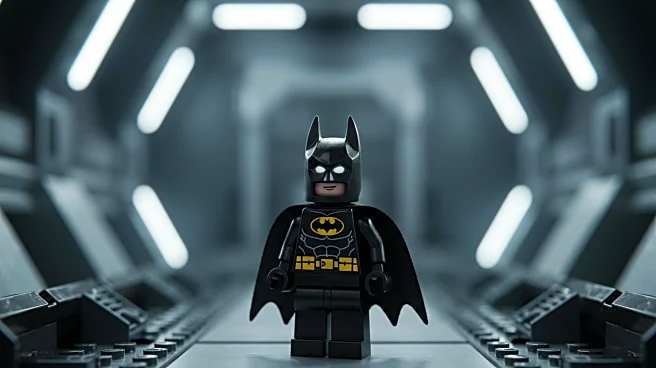What's Happening?
DC Studios, under the leadership of James Gunn, is revitalizing its gaming division with the announcement of Lego Batman: Legacy of the Dark Knight. Set to launch in 2026, the game will be available on multiple platforms including Xbox Series X|S, PS5, Nintendo Switch 2, and PC. The game promises to deliver an open-world Gotham City experience, featuring content from popular Batman stories. TT Games, known for its work on Lego adaptations of The Lord of the Rings and Star Wars, is developing the game. The reveal trailer showcased callbacks to iconic Batman moments from films and games, with a combat system reminiscent of the Batman Arkham series.
Why It's Important?
The announcement of Lego Batman: Legacy of the Dark Knight marks a significant step for DC Studios in expanding its gaming portfolio. By leveraging the popularity of Batman and the nostalgic appeal of Lego games, DC Studios aims to capture a wide audience, from long-time Batman fans to younger gamers. The game's open-world design and intricate gameplay systems could set a new standard for Lego games, potentially boosting sales and engagement. This development also highlights the growing trend of integrating cinematic elements into video games, enhancing storytelling and player immersion.
What's Next?
As the game is set for a 2026 release, fans can expect more details and gameplay previews in the coming months. TT Games will likely continue to refine the game's mechanics and expand its promotional efforts. The gaming community and Batman enthusiasts will be watching closely for updates on character inclusions, storyline developments, and gameplay features. Additionally, the game's success could influence future collaborations between DC Studios and TT Games, potentially leading to more Lego adaptations of popular DC characters.
Beyond the Headlines
The integration of various Batman adaptations into a single game raises interesting cultural and ethical questions about intellectual property and creative storytelling. By blending elements from different media, the game could offer a unique narrative experience that challenges traditional storytelling methods. This approach may also spark discussions about the preservation of iconic characters and their evolution across different platforms.









